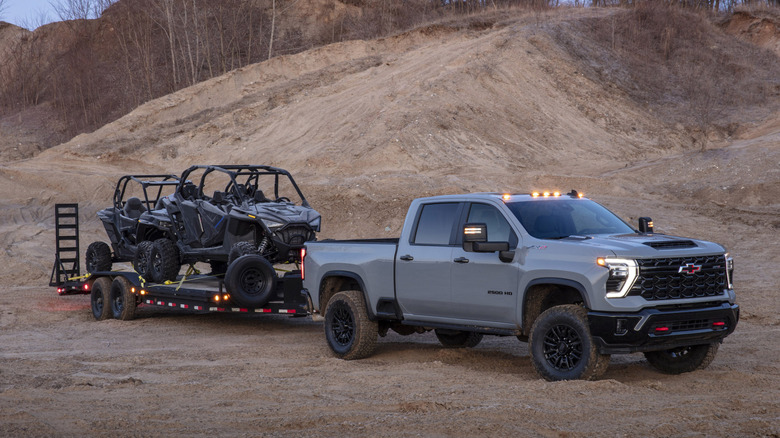Towing Capacity Vs. Maximum Tongue Weight: Why Knowing This Difference Is Crucial To Safety
There are all sorts of numbers associated with modern vehicles, especially trucks or SUVs that are designed as workhorses for heavy duty tasks. Knowing your truck's towing capacity, however, could save you some serious headaches — and one of the first numbers you'll likely want to know is towing capacity. Towing capacity is a pretty simple concept – it's the maximum amount of weight your vehicle can safely pull behind it as recommended by the manufacturer. Most vehicles have the maximum towing capacity listed on the driver's door jamb. It's right there alongside other important information like recommended tire pressures, the vehicle identification number (VIN), and GVWR, so it's easy to find. If the sticker from your door jamb is missing, it's also possible to find that information in the owner's manual.
If you're pulling a trailer, exceeding the vehicle's towing capacities could cause a lot of problems. If you overload the tow hitch, for instance, it could damage the vehicle or cause the driver to lose control of the tow vehicle, potentially jeopardizing the safety of the vehicle operator and everyone around them. It's never a good idea to tow more than the listed capacity of your vehicle – even if it's physically possible to set off and get the vehicle up to speed. But making sure your trailer is properly loaded is equally important for a safe towing experience.
How does tongue weight factor in?
Maximum Tongue Weight is the limit for the amount of weight that's pushing down on tow hitch. This specific weight is affected by where the weight is distributed on your trailer, so a trailer loaded with the same amount of weight, in different locations, will have different affects on tongue weight. A car trailer, for example, with the car pulled all the way forward on the trailer, will distribute the weight forward and put more weight on the hitch, as opposed to a car that's backed all the way up on the same trailer. Automakers and trailer manufacturers alike recommend that approximately 10-15% of the trailer's total weight should be balanced onto standard hitches. So, if you're towing an 8,000-pound trailer for example, aiming for 10 percent of that trailer's weight to be pushing down on the tow hitch, that's 800 pounds of tongue weight.
Auto and trailer manufacturers also recommend a weight balance with 60 percent of the weight on the front half of the trailer and 40 percent loaded on the rear, for the safest experience. Balancing the weight improperly can make the trailer too tail heavy which can cause excessive sway – a real danger when towing. Balancing weight laterally across the trailer is important too. Imbalanced weight can cause uneven tire wear, especially towing over long distances. Once you've got all the basics covered, you can start looking into towing accessories that will make your experience easier and more enjoyable.

